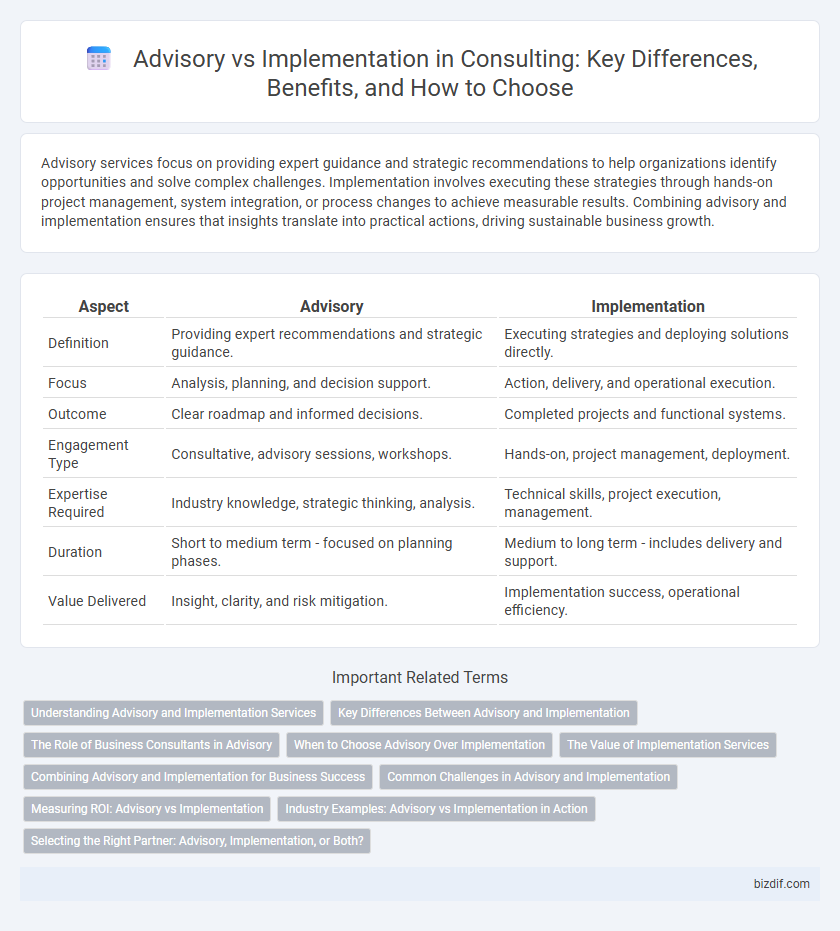Advisory services focus on providing expert guidance and strategic recommendations to help organizations identify opportunities and solve complex challenges. Implementation involves executing these strategies through hands-on project management, system integration, or process changes to achieve measurable results. Combining advisory and implementation ensures that insights translate into practical actions, driving sustainable business growth.
Table of Comparison
| Aspect | Advisory | Implementation |
|---|---|---|
| Definition | Providing expert recommendations and strategic guidance. | Executing strategies and deploying solutions directly. |
| Focus | Analysis, planning, and decision support. | Action, delivery, and operational execution. |
| Outcome | Clear roadmap and informed decisions. | Completed projects and functional systems. |
| Engagement Type | Consultative, advisory sessions, workshops. | Hands-on, project management, deployment. |
| Expertise Required | Industry knowledge, strategic thinking, analysis. | Technical skills, project execution, management. |
| Duration | Short to medium term - focused on planning phases. | Medium to long term - includes delivery and support. |
| Value Delivered | Insight, clarity, and risk mitigation. | Implementation success, operational efficiency. |
Understanding Advisory and Implementation Services
Advisory services in consultancy focus on providing expert guidance, strategic planning, and problem-solving frameworks to help organizations identify opportunities and challenges. Implementation services involve executing the recommended strategies, managing projects, and delivering tangible results through hands-on actions and operational changes. Understanding the distinction between advisory and implementation enables businesses to align their needs with appropriate consultancy support for maximum impact.
Key Differences Between Advisory and Implementation
Advisory focuses on providing expert analysis, strategic planning, and recommendations to help organizations make informed decisions, while implementation involves executing these strategies through project management, change management, and hands-on solutions. Advisory services emphasize insight generation and long-term strategy alignment, whereas implementation centers on the practical application of those strategies to achieve measurable outcomes. The key difference lies in advisory's role in guiding decision-making versus implementation's responsibility in delivering tangible results.
The Role of Business Consultants in Advisory
Business consultants in advisory roles analyze organizational challenges, provide strategic insights, and recommend tailored solutions to enhance business performance. Their expertise spans market analysis, process optimization, and risk management, enabling informed decision-making and long-term growth. Advisory consultants focus on empowering clients with actionable plans rather than direct execution, ensuring sustainable improvement and knowledge transfer.
When to Choose Advisory Over Implementation
Advisory is ideal when organizations seek expert guidance to shape strategy, assess risks, or identify opportunities without altering existing operations immediately. Choosing advisory over implementation is crucial during early-stage decision-making, enabling informed planning and stakeholder alignment before committing resources to change. This approach minimizes disruption while leveraging industry insights to refine objectives and roadmap development.
The Value of Implementation Services
Implementation services transform strategic advisory into actionable results by ensuring plans are executed effectively within organizational structures. They deliver measurable outcomes through hands-on support, technology integration, and change management, bridging the gap between theory and practice. This direct involvement increases ROI by accelerating project timelines and enhancing stakeholder engagement.
Combining Advisory and Implementation for Business Success
Combining advisory and implementation services enables businesses to translate strategic insights into actionable outcomes, ensuring seamless execution and measurable results. Expert consultants not only identify growth opportunities and optimize processes but also oversee the deployment of solutions, bridging the gap between planning and operational success. This integrated approach maximizes return on investment by aligning strategic vision with practical execution, driving sustained business performance.
Common Challenges in Advisory and Implementation
Consultancy projects often face challenges such as misaligned client expectations, budget constraints, and resistance to change during both advisory and implementation phases. Advisory challenges include providing strategic guidance while ensuring client understanding and commitment to recommendations. Implementation hurdles frequently involve adapting plans to operational realities, maintaining stakeholder engagement, and measuring impact effectively to ensure sustainable outcomes.
Measuring ROI: Advisory vs Implementation
Measuring ROI in consultancy requires differentiating between advisory and implementation phases, as advisory services primarily deliver strategic insights that guide decision-making, often resulting in delayed financial impact. Implementation directly influences ROI through tangible execution of strategies, enabling real-time tracking of cost savings, efficiency gains, and revenue growth. Effective consultancy measures ROI by combining advisory foresight with implementation metrics to capture both immediate and long-term business value.
Industry Examples: Advisory vs Implementation in Action
In consultancy, advisory services provide strategic recommendations tailored to industries like finance, healthcare, and manufacturing, guiding clients on regulatory compliance, digital transformation, and operational efficiency. Implementation involves executing these strategies through project management, technology integration, and process reengineering, as seen in cases like ERP system deployment in manufacturing or telehealth platform setup in healthcare. Industry examples highlight how advisory shapes decision-making while implementation drives tangible business outcomes, ensuring cohesive advancement from plan to practice.
Selecting the Right Partner: Advisory, Implementation, or Both?
Selecting the right partner in consultancy hinges on your organization's needs, whether strategic guidance through advisory services or hands-on execution with implementation expertise. Advisory partners provide valuable insights, risk assessment, and roadmap development, while implementation partners focus on delivering tangible results and operational changes. Combining both advisory and implementation ensures a seamless transition from planning to execution, maximizing project success and return on investment.
Advisory vs Implementation Infographic

 bizdif.com
bizdif.com